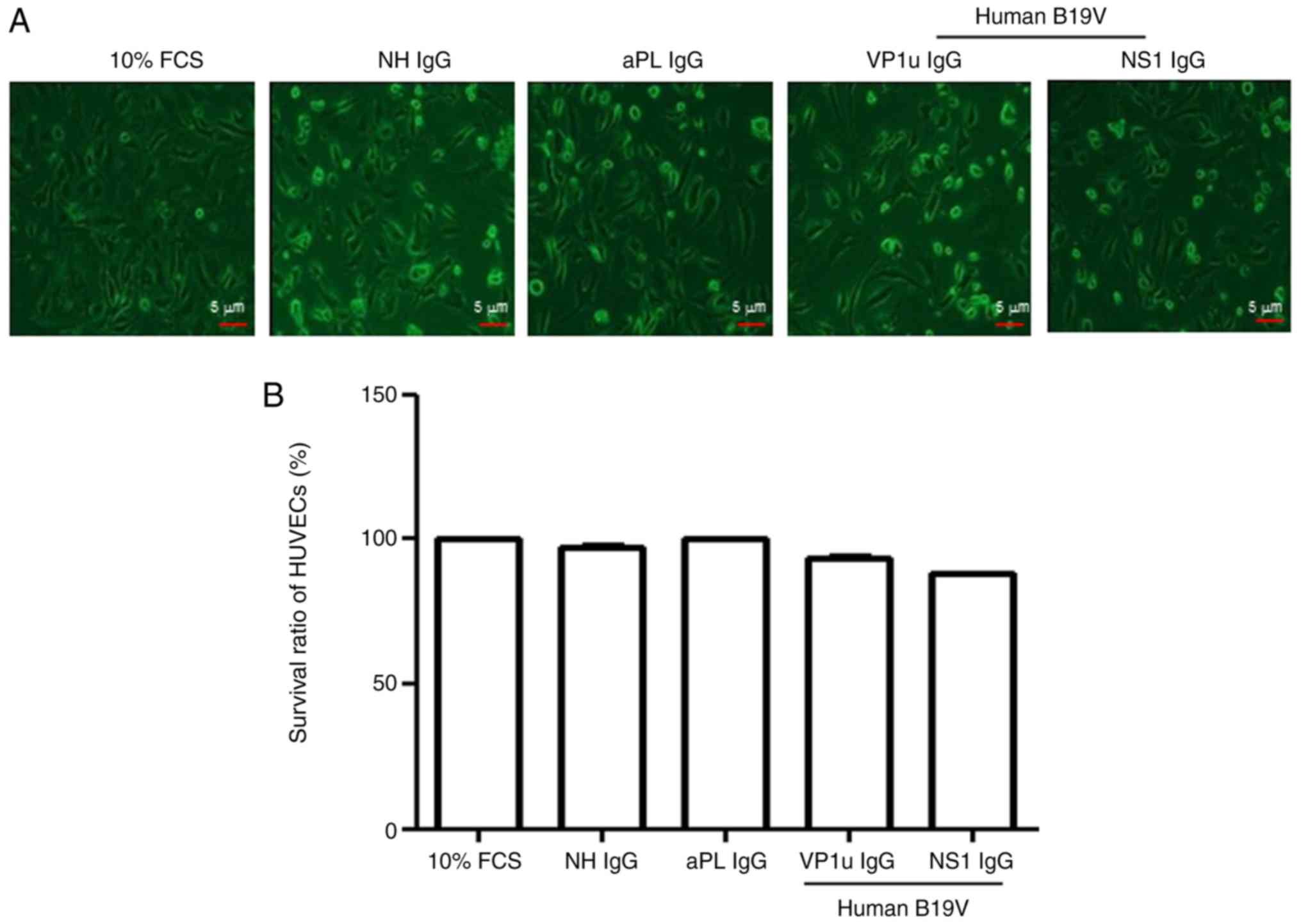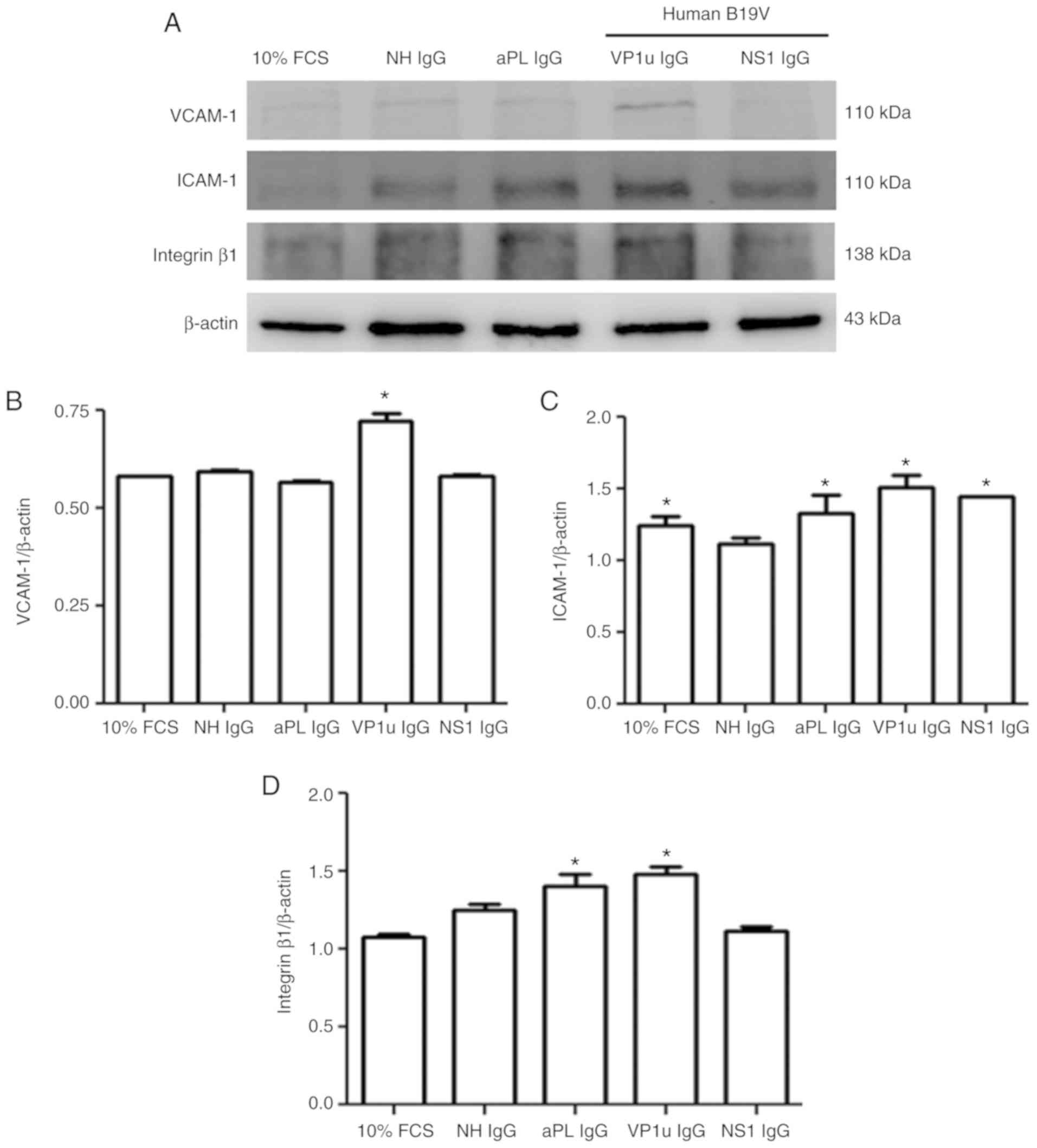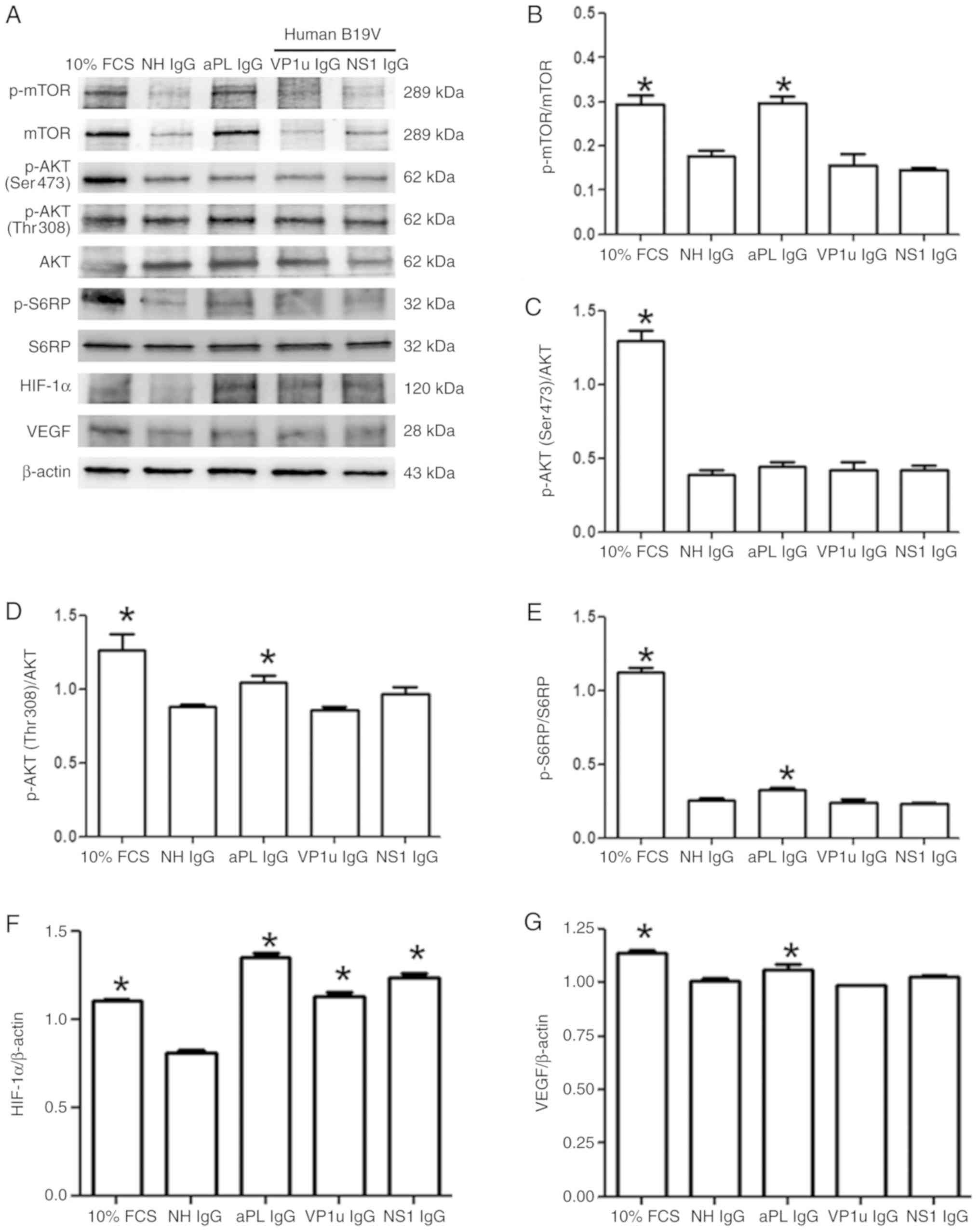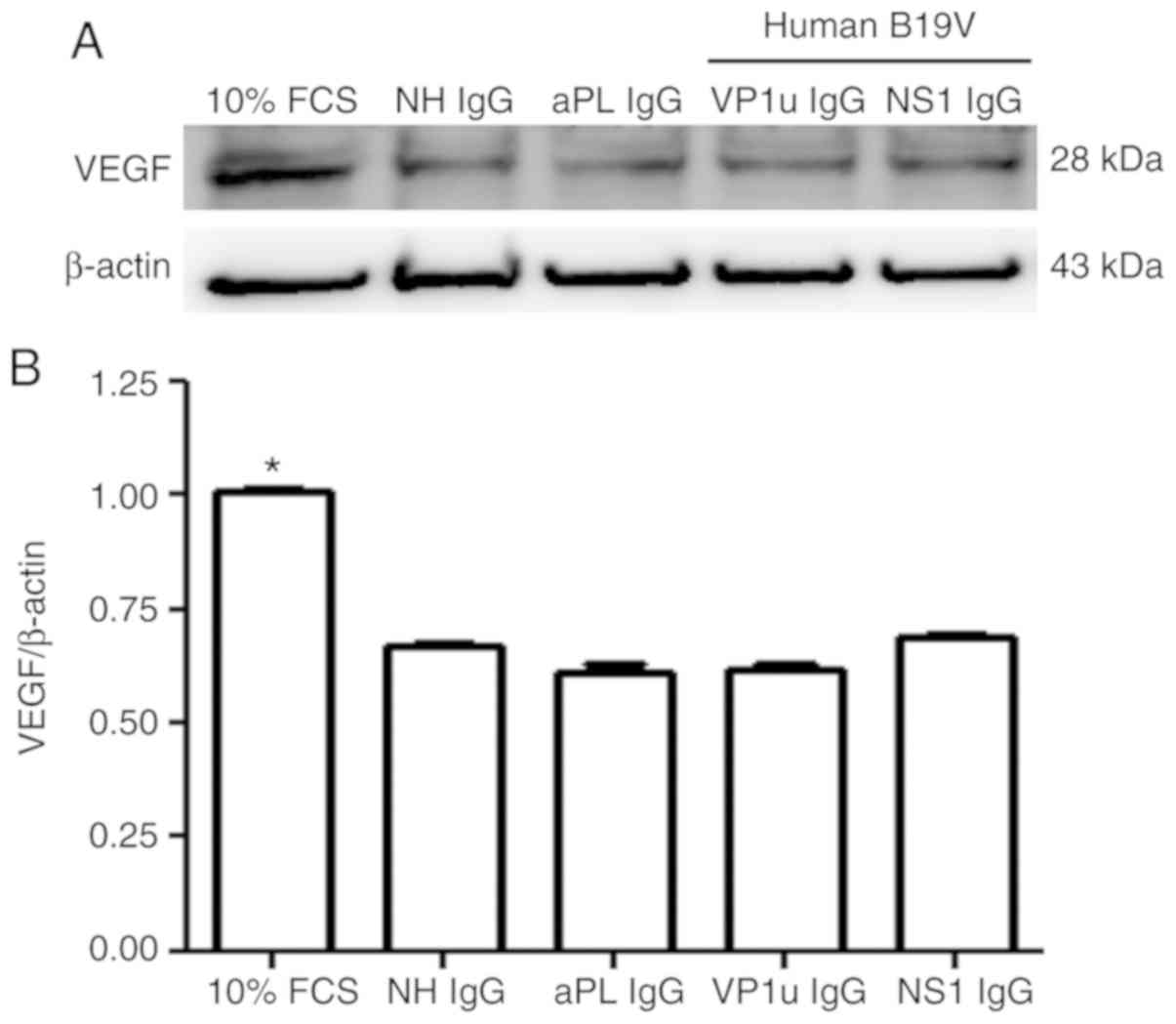|
1
|
Anderson MJ, Jones SE, Fisher-Hoch SP,
Lewis E, Hall SM, Bartlett CL, Cohen BJ, Mortimer PP and Pereira
MS: Human parvovirus, the cause of erythema infectiosum (fifth
disease)? Lancet. 1:13781983. View Article : Google Scholar : PubMed/NCBI
|
|
2
|
Reid DM, Reid TM, Brown T, Rennie JA and
Eastmond CJ: Human parvovirus-associated arthritis: A clinical and
laboratory description. Lancet. 1:422–425. 1985. View Article : Google Scholar : PubMed/NCBI
|
|
3
|
Serjeant GR, Topley JM, Mason K, Serjeant
BE, Pattison JR, Jones SE and Mohamed R: Outbreak of aplastic
crises in sickle cell anaemia associated with parvovirus-like
agent. Lancet. 2:595–597. 1981. View Article : Google Scholar : PubMed/NCBI
|
|
4
|
Brown T, Anand A, Ritchie LD, Clewley JP
and Reid TM: Intrauterine parvovirus infection associated with
hydrops fetalis. Lancet. 2:1033–1034. 1984. View Article : Google Scholar : PubMed/NCBI
|
|
5
|
Meyer O: Parvovirus B19 and autoimmune
diseases. Joint Bone Spine. 70:6–11. 2003. View Article : Google Scholar : PubMed/NCBI
|
|
6
|
Kerr JR: The role of parvovirus B19 in the
pathogenesis of autoimmunity and autoimmune disease. J Clin Pathol.
69:279–91. 2016. View Article : Google Scholar : PubMed/NCBI
|
|
7
|
Dorsch S, Liebisch G, Kaufmann B, von
Landenberg P, Hoffmann JH, Drobnik W and Modrow S: The VP1 unique
region of parvovirus B19V and its constituent phospholipase A2-like
activity. J Virol. 76:2014–2018. 2002. View Article : Google Scholar : PubMed/NCBI
|
|
8
|
Tzang BS, Lee YJ, Yang TP, Tsay GJ, Shi
JY, Tsai CC and Hsu TC: Induction of antiphospholipid antibodies
and antiphospholipid syndrome-like autoimmunity in naive mice with
antibody against human parvovirus B19 VP1 unique region protein.
Clin Chim Acta. 382:31–36. 2007. View Article : Google Scholar : PubMed/NCBI
|
|
9
|
Tzang BS, Tsay GJ, Lee YJ, Li C, Sun YS
and Hsu TC: The association of VP1 unique region protein in acute
parvovirus B19 infection and anti-phospholipid antibody production.
Clin Chim Acta. 378:59–65. 2007. View Article : Google Scholar : PubMed/NCBI
|
|
10
|
Lin CY, Chiu CC, Cheng J, Lin CY, Shi YF,
Tsai CC, Tzang BS and Hsu TC: Antigenicity analysis of human
parvovirus B19-VP1u protein in the induction of anti-phospholipid
syndrome. Virulence. 9:208–216. 2018. View Article : Google Scholar : PubMed/NCBI
|
|
11
|
Von Landenberg P, Lehmann HW, Knöll A,
Dorsch S and Modrow S: Antiphospholipid antibodies in pediatric and
adult patients with rheumatic disease are associated with
parvovirus B19 infection. Arthritis Rheum. 48:1939–1947. 2003.
View Article : Google Scholar : PubMed/NCBI
|
|
12
|
Lunardi C, Tinazzi E, Bason C, Dolcino M,
Corrocher R and Puccetti A: Human parvovirus B19 infection and
autoimmunity. Autoimmun Rev. 8:116–120. 2008. View Article : Google Scholar : PubMed/NCBI
|
|
13
|
Miyakis S, Lockshin MD, Atsumi T, Branch
DW, Brey RL, Cervera R, Derksen RH, DE Groot PG, Koike T, Meroni
PL, et al: International consensus statement on an update of the
classifi cation criteria for definite antiphospholipid syndrome
(APS). J Thromb Haemost. 4:295–306. 2006. View Article : Google Scholar : PubMed/NCBI
|
|
14
|
Linnemann B: Antiphospholipid syndrome -
an update. Vasa. 47:451–464. 2018. View Article : Google Scholar : PubMed/NCBI
|
|
15
|
Chen DY, Tzang BS, Chen YM, Lan JL, Tsai
CC and Hsu TC: The association of anti-parvovirus B19-VP1 unique
region antibodies with antiphospholipid antibodies in patients with
antiphospholipid syndrome. Clin Chim Acta. 411:1084–1089. 2010.
View Article : Google Scholar : PubMed/NCBI
|
|
16
|
Loizou S, Cazabon JK, Walport MJ, Tait D
and So AK: Similarities of specificity and cofactor dependence in
serum antiphospholipid antibodies from patients with human
parvovirus B19 infection and from those with systemic lupus
erythematosus. Arthritis Rheum. 40:103–108. 1997. View Article : Google Scholar : PubMed/NCBI
|
|
17
|
Tzang BS, Tsai CC, Chiu CC, Shi JY and Hsu
TC: Up-regulation of adhesion molecule expression and induction of
TNF-alpha on vascular endothelial cells by antibody against human
parvovirus B19 VP1 unique region protein. Clin Chim Acta.
395:77–83. 2008. View Article : Google Scholar : PubMed/NCBI
|
|
18
|
George J, Blank M, Levy Y, Meroni P,
Damianovich M, Tincani A and Shoenfeld Y: Differential effects of
anti-beta2-glycoprotein I antibodies on endothelial cells and on
the manifestations of experimental antiphospholipid syndrome.
Circulation. 97:900–906. 1998. View Article : Google Scholar : PubMed/NCBI
|
|
19
|
Vega-Ostertag M, Casper K, Swerlick R,
Ferrara D, Harris EN and Pierangeli SS: Involvement of p38 MAPK in
the up-regulation of tissue factor on endothelial cells by
antiphospholipid antibodies. Arthritis Rheum. 52:1545–1554. 2005.
View Article : Google Scholar : PubMed/NCBI
|
|
20
|
Di Simone N, Di Nicuolo F, D'Ippolito S,
Castellani R, Tersigni C, Caruso A, Meroni P and Marana R:
Antiphospholipid antibodies affect human endometrial angiogenesis.
Biol Reprod. 83:212–219. 2010. View Article : Google Scholar : PubMed/NCBI
|
|
21
|
Velásquez M, Rojas M, Abrahams VM,
Escudero C and Cadavid ÁP: Mechanisms of endothelial dysfunction in
antiphospholipid syndrome: Association with clinical
manifestations. Front Physiol. 9:18402018. View Article : Google Scholar : PubMed/NCBI
|
|
22
|
Canaud G, Bienaimé F, Tabarin F, Bataillon
G, Seilhean D, Noël LH, Dragon-Durey MA, Snanoudj R, Friedlander G,
Halbwachs-Mecarelli L, et al: Inhibition of the mTORC pathway in
the antiphospholipid syndrome. N Engl J Med. 371:303–312. 2014.
View Article : Google Scholar : PubMed/NCBI
|
|
23
|
Sakamoto Y, Terashita N, Muraguchi T,
Fukusato T and Kubota S: Effects of epigallocatechin-3-gallate
(EGCG) on A549 lung cancer tumor growth and angiogenesis. Biosci
Biotechnol Biochem. 77:1799–1803. 2013. View Article : Google Scholar : PubMed/NCBI
|
|
24
|
Amann A, Zwierzina M, Koeck S, Gamerith G,
Pechriggl E, Huber JM, Lorenz E, Kelm JM, Hilbe W, Zwierzina H and
Kern J: Development of a 3D angiogenesis model to study
tumour-endothelial cell interactions and the effects of
anti-angiogenic drugs. Sci Rep. 7:29632017. View Article : Google Scholar : PubMed/NCBI
|
|
25
|
Tsai CC, Chiu CC, Hsu JD, Hsu HS, Tzang BS
and Hsu TC: Human parvovirus B19 NS1 protein aggravates liver
injury in NZB/W F1 mice. PLoS One. 8:e5972420132013.
|
|
26
|
Raschi E, Testoni C, Borghi MO, Fineschi S
and Meroni PL: Endothelium activation in the anti-phospholipid
syndrome. Biomed Pharmacother. 57:282–286. 2003. View Article : Google Scholar : PubMed/NCBI
|
|
27
|
Meroni PL, Raschi E, Testoni C and Borghi
MO: Endothelial cell activation by antiphospholipid antibodies.
Clin Immunol. 112:169–174. 2004. View Article : Google Scholar : PubMed/NCBI
|
|
28
|
Shi T, Giannakopoulos B, Yan X, Yu P,
Berndt MC, Andrews RK, Rivera J, Iverson GM, Cockerill KA, Linnik
MD and Krilis SA: Anti-beta2-glycoprotein I antibodies in complex
with beta2-glycoprotein I can activate platelets in a dysregulated
manner via glycoprotein Ib-IX–V. Arthritis Rheum. 54:2558–2567.
2006. View Article : Google Scholar : PubMed/NCBI
|
|
29
|
de Laat B, Derksen RH, van Lummel M,
Pennings MT and de Groot PG: Pathogenic anti-beta2-glycoprotein I
antibodies recognize domain I of beta2-glycoprotein I only after a
conformational change. Blood. 107:1916–1924. 2006. View Article : Google Scholar : PubMed/NCBI
|
|
30
|
D'Ippolito S, Marana R, Di Nicuolo F,
Castellani R, Veglia M, Stinson J, Scambia G and Di Simone N:
Effect of low molecular weight heparins (LMWHs) on antiphospholipid
antibodies (aPL)-mediated inhibition of endometrial angiogenesis.
PLoS One. 7:e296602012. View Article : Google Scholar : PubMed/NCBI
|
|
31
|
Mitsiades CS, Mitsiades N and Koutsilieris
M: The Akt pathway: Molecular targets for anti-cancer drug
development. Curr Cancer Drug Targets. 4:235–256. 2004. View Article : Google Scholar : PubMed/NCBI
|
|
32
|
Jitschin R, Peters O, Plentz A, Turowski
P, Segerer H and Modrow S: Impact of parvovirus B19 infection on
paediatric patients with haematological and/or oncological
disorders. Clin Microbiol Infect. 17:1336–1342. 2011. View Article : Google Scholar : PubMed/NCBI
|
|
33
|
Yousif L, Hammer GP, Blettner M and Zeeb
H: A systematic literature review and meta-analysis. J Med Virol.
85:2165–2175. 2013. View Article : Google Scholar : PubMed/NCBI
|
|
34
|
Ibrahem WN, Hasony HJ and Hassan JG: Human
parvovirus B19 in childhood acute lymphoblastic leukaemia in
Basrah. J Pak Med Assoc. 64:9–12. 2014.PubMed/NCBI
|
|
35
|
Li Y, Wang J, Zhu G, Zhang X, Zhai H,
Zhang W, Wang W and Huang G: Detection of parvovirus B19 nucleic
acids and expression of viral VP1/VP2 antigen in human colon
carcinoma. Am J Gastroenterol. 102:1489–1498. 2007. View Article : Google Scholar : PubMed/NCBI
|
|
36
|
Wang JH, Zhang WP, Liu HX, Wang D, Li YF,
Wang WQ, Wang L, He FR, Wang Z, Yan QG, et al: Detection of human
parvovirus B19 in papillary thyroid carcinoma. Br J Cancer.
98:611–618. 2008. View Article : Google Scholar : PubMed/NCBI
|


















